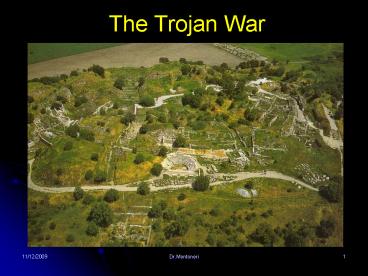The Trojan War - PowerPoint PPT Presentation
1 / 14
Title:
The Trojan War
Description:
This is the incident that sparked the legendary Trojan War. a. Helen and Paris ... have been to join the expedition, Odysseus fought heroically in the Trojan War ... – PowerPoint PPT presentation
Number of Views:708
Avg rating:3.0/5.0
Title: The Trojan War
1
The Trojan War
2
Outline
- Introduction
- Part I. Origin of the war
- a. Helen and Paris
- b. The siege of Troy
- Part II. The destruction of Troy
- a. Achilles versus Hector
- b. Odysseus and the wooden horse
- Conclusion
- References
3
Introduction
- In Greek legend, famous war between the Greeks
and the city of Troy (Anatolia, part of
present-day Turkey) - Modern archaeological excavations have shown that
Troy was destroyed by fire sometime between 1230
BC and 1180 BC - Homer, name traditionally assigned to the author
of the Iliad and the Odyssey, the two major epics
of Greek antiquity - The poems were composed in the Greek settlements
on the coast of Asia Minor in the 8th century BC
4
Part I. Origin of the War
- A golden apple thrown by Eris, goddess of discord
- The award of the apple to Aphrodite, goddess of
love, by Paris, son of King Priam of Troy,
secured for Paris the favor of the goddess and
the love of the beautiful Helen of Troy, wife of
Menelaus, the king of Sparta
5
The Judgment of Paris (1635), Rubens, based on
the myth in which Paris is asked by three
goddesses to decide which of them is the most
beautiful. This is the incident that sparked the
legendary Trojan War
6
a. Helen and Paris
- Helen went with Paris to Troy, and an expedition
to avenge the injury to Menelaus was placed under
the command of Agamemnon, king of Mycenae - Agamemnon's force included many famous Greek
heroes, the most noted of whom were Achilles,
Patroclus, the two Ajaxes, Teucer, Nestor,
Odysseus, and Diomedes
7
Paris and Helen, painting by David
8
b. The siege of Troy
- After the Trojans refused to restore Helen to
Menelaus, the Greek warriors assembled at the Bay
of Aulis and proceeded to Troy in 1000 ships - Agamemnon was selected as the leader of the force
since he gave the most troops to the effort - The siege lasted ten years, the first nine of
which were uneventful the Iliad is starting the
10th year
9
Part II. The destruction of Troy
- The mythological gods gather to debate the fate
of the humanswhether they will allow them to
settle their dispute in a civil manner, or
whether they will put the forces in motion that
will ensure total destruction for both sides and
for an entire civilization - Paris, a Trojan, judged Aphrodite the fairest
over Hera. She, Athena, Poseidon help the Greeks.
Aphrodite, Apollo and Artemis were on the Trojan
side
10
a. Achilles versus Hector
- In the tenth year, Achilles withdrew from battle
because of his anger with Agamemnon - To avenge the death of his friend Patroclus,
Achilles returned to battle and killed Hector,
the principal Trojan warrior - Subsequent events, described in later epic poems,
included Achilles' victories over Penthesilea,
queen of the Amazons, and Memnon, king of
Ethiopia, and the death of Achilles at the hands
of Paris
11
b. Odysseus and the wooden horse
- Odysseus (called Ulysses in Latin) was the son of
Laertes and was the ruler of the island kingdom
of Ithaca - However reluctant he may have been to join the
expedition, Odysseus fought heroically in the
Trojan War - He was the originator of the Trojan horse, the
stratagem by which the Greeks were finally able
to take the city of Troy itself
12
The Greeks defeated the Trojans by an act of
trickery. Led by Odysseus, they constructed a
giant wooden horse and left it outside the walls
of Troy. The Trojans pulled the horse into the
city, not knowing that Greek soldiers were hiding
inside the horse. That night, the Greeks crept
out of the horse and took the city by surprise
13
Conclusion
- The city of Troy was captured at last by
treachery - The Greeks sacked and burned the city
- Only a few Trojans escaped, the most famous being
Aeneas, who led the other survivors to what is
present-day Italy this story is told by Virgil
in the Aeneid - The return of the Greek warriors to Greece
inspired epic poems, the most celebrated being
that of Odysseus, whose 10-year wanderings and
arrival in Ithaca are told in Homer's Odyssey
14
References
- http//encarta.msn.com/encnet/refpages/RefArticle.
aspx?refid761556458 - http//darkwing.uoregon.edu/joelja/odyssey.html
- http//classics.mit.edu/Homer/iliad.html
- http//www.lonelyplanet.com/destinations/europe/gr
eece - http//encarta.msn.com/encnet/refpages/RefArticle.
aspx?refid761552842 - http//www.cyberessays.com/English/102.htm
- http//www.wic.org/artwork/helent.htm
- http//www.bulfinch.org/fables/bull27.html
- http//www.enl.umassd.edu/InteractiveCourse/Homer/
iliad.html































